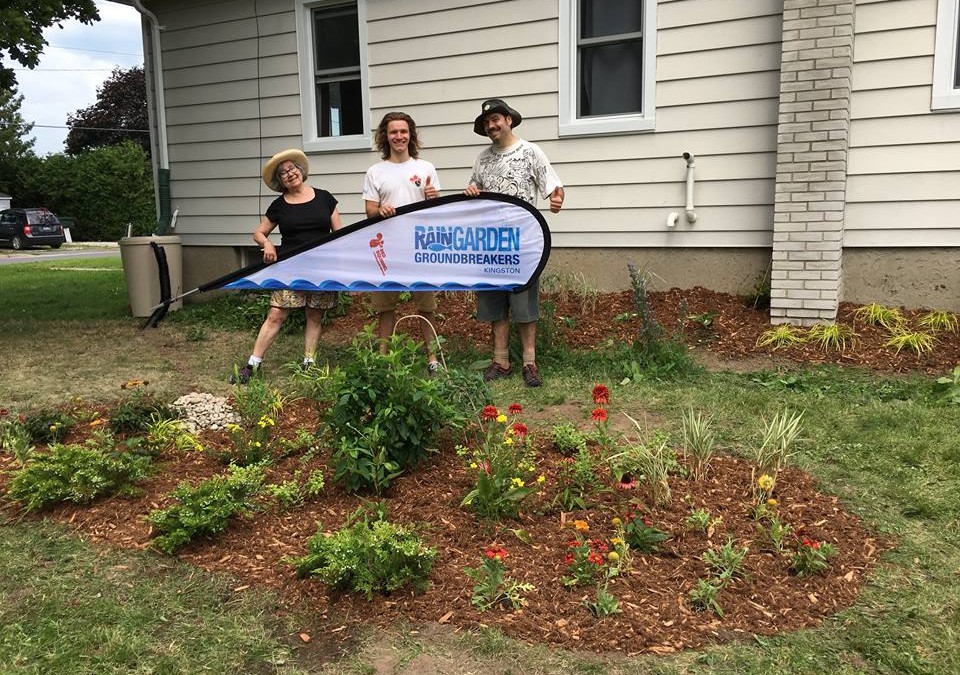Photo: Groundbreakers residential rain garden by Red Squirrel Conservation Services in Kingston
Readers of the Umbrella Stormwater Bulletin are working every day to protect their communities’ water resources. On this World Water Day, let’s celebrate and congratulate each other for the work we do. Share a recent project you’ve worked on in your community that you’re proud of! We may feature you in upcoming issues of the bulletin.
At Green Communities Canada, we’re proud of the work we’ve done with our partners Ecosuperior in Thunder Bay, Red Squirrel Conservation Services in Kingston, and Green UP in Peterborough to engage with flood-prone neighbourhoods and install demonstration runoff reduction retrofits on public and private properties – a project we’re collectively calling RAIN Garden Groundbreakers. We’re excited to see other communities taking on similar projects, and ultimately we’d like to see zero-runoff neighbourhoods popping up across Canada. Stay tuned for more about Groundbreakers in a future issue!
What water projects are you proud of in your community? Comment on this blog post or tag us on Facebook (@raincommunitysolutions) or Twitter (@RainProgram)!
NEWS
UN champions green infrastructure. A new UN report on water highlights how green infrastructure can complement traditional infrastructure in solving water problems around the world.
Can we scare ourselves into better water management? Psychology researchers investigate how, when confronted with news or information that threatens our lives (like scary headlines about flooding or water scarcity), the human brain tends to put up defenses – making us less likely to take action. Different communications approaches are needed if we want to create positive change.
Researchers investigate how to destroy contaminants in stormwater. A $1.4 million grant will fund researchers at the University of Maryland to look at how toxins and other pollution can be captured and broken down before leaving sites and contaminating ground and surface water.
Green infrastructure and green jobs. Washington D.C. is investing heavily in green infrastructure, using an innovative credit trading system. The results are starting to be seen on the ground, and they include not only benefits for water quality, but for the workforce that is being trained to construct and maintain the green infrastructure practices. The U.S. now has a national certification system for green infrastructure workers.
How are we measuring flood risk? A new study claims that FEMA, by using old and unreliable data, has drastically underestimated the flood risk in many areas of the U.S. In Canada, the alarm has also been raised that flood plain maps are outdated and collected in different ways in different provinces – and they don’t account for urban flood risk, which in many areas is greater than riverine. A recent study that models the combined impacts of climate change and land use cover changes in Calgary predicts more flooding, and researchers warn that similar trends will be seen in other watersheds. Some are calling for a national flood strategy to address these issues.
Stronger permeable pavement. Researchers at Washington State University have found that grinding up carbon fiber waste (provided by Boeing) and including it permeable concrete greatly increases its durability. Until now, permeable pavement has only been appropriate for low traffic areas (sidewalks, parking lots) not higher speed roadways – a more durable medium could expand the range of its applications.
Toronto invests in preventing sewer overflows. A massive tunnel over 10 km in length will be constructed to hold stormwater during heavy rain events to prevent excess flows in the Coxwell sewer line. The $360 million project will begin construction later this year, and is only one part of a larger project to improve water quality in the Don river.

